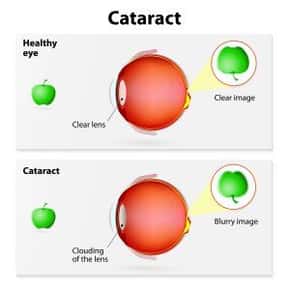
With cataract surgery, your ophthalmologist removes the cataract-diseased lens of your eye. The ophthalmologist then replaces your natural lens with an artificial one.
The Procedure
This outpatient procedure is generally safe and takes less than an hour. Your ophthalmologist will dilate your pupil with eye drops and administer local anesthetic eye drops. You may also be prescribed a sedative to counter anxiety.
Once your eye surgeon has made a small, self-sealing incision in the eye, he or she performs a step called phacoemulsification. During this step of the procedure, the ophthalmologist inserts a thin probe into the cataractous lens and uses ultrasound waves to break it up, before suctioning out the pieces.
Once your eye surgeon removes your cataract, he or she implants an intraocular lens (IOL). IOLs come in a wide variety of materials and functions. Some help with both near and distant vision, similar to bifocals. Others block ultraviolet light. You and your doctor will discuss the best type for you.
If you need cataract surgery in both eyes, your doctor will likely recommend doing one at a time, with a healing period in between.
Recovery
Usually, you can go home on the day of your surgery. However, you’ll need to arrange for somebody to drive you home from the surgical facility. You might also need help around the house, as your doctor may restrict bending and lifting for a few days.
Expect mild discomfort, light sensitivity, fluid discharge and itching for a few days after surgery. For a short period of time after surgery, you may need to wear a patch or eye shield while sleeping or take medications that control eye pressure.
Your eye doctor will schedule follow-up visits to monitor your progress. Once healed, you’ll get a new prescription for eyeglasses, if necessary.
After surgery, some people develop a secondary cataract, also called posterior capsule opacification. Eye surgeons can usually treat a secondary cataract with a quick, painless outpatient procedure.
Risks
Cataracts are usually treated safely and successfully. However, risks — while uncommon — do exist. These include swelling, infection, inflammation, retinal detachment, glaucoma and loss of vision. People with serious medical conditions or other eye diseases are at increased risk of complications.
If you suspect you need cataract surgery, call us today to discuss your options.
